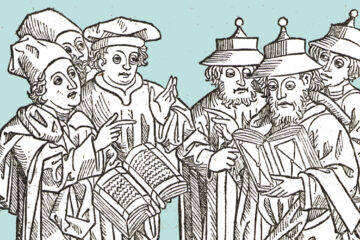Shylock, again
Shakespeare digs deep in his rhetorical toolbox to construct the perfect anti-hero

By Miriamne Krummel, Special To The Dayton Jewish Observer
The Theatre Department at Wright State University is staging William Shakespeare’s The Merchant of Venice (circa 1596) this month. Should this production be a topic of discussion for Dayton’s Jews?
I ask this question because The Merchant of Venice has been marked as an antisemitic play, and many scholars have discussed the ways that the play rides on antisemitic themes.
After all, one of the main characters, Shylock, embodies many of the antisemitic tropes bandied about in Elizabethan England. And here’s the problem: these libels — that Jews are obsessed with money, that Jews value money more than members of their family, that Jews will “exact a pound of flesh” or seek revenge at all costs — still surface in certain quarters in our modern world.

Reviving antisemitic sentiments can be a cause for concern then. While a production of Shakespeare’s The Merchant of Venice should not generate as much concern as a showing of, say, Mel Gibson’s The Passion of the Christ, there still might be some warranted concern among some members of our Jewish community. I understand the worry over an antisemitic backlash, but I propose that we think about Shylock as a victim to be pitied rather than a monster to be reviled.
When we talk about Shylock, we often talk about him out of context. Some pretty reprehensible images of Jews existed before Shakespeare’s Shylock appeared on the Early Modern stage.
Two of Shylock’s predecessors, for instance — Barabas from Christopher Marlowe’s The Jew of Malta (1589) and the nameless Jewish “homicides” from Geoffrey Chaucer’s Prioress’s Tale (14th century) — feature murderous intent from the onset. Barabas orchestrates a stratagem that ends with the objective to commit murder, but his plans are thwarted. The Prioress’s Jews succeed in their murderous plot and slay a little boy.
Shakespeare’s Shylock is different from Marlowe’s Barabas and the Prioress’s Jews. Shylock wants revenge. Shylock wants his pound of flesh. Shylock feels he is owed this debt since Antonio, the merchant of Venice, agreed to pay this unusual fee should Antonio have to default on his loan.
To Shylock, Antonio’s debt is simple mathematics. But the issue of Shylock’s demand in Act IV that Antonio prove good to his contract and provide a pound of flesh is not physically possible without Antonio’s death. Demanding the payment of the debt owed has far worse implications than the actual default on a loan.
Now, let’s return to Shylock. His desire for revenge can seem reasonable: Shylock’s method to enact this revenge presents the problem. But therein lies the antisemitic tradition that Shakespeare labors under: Shylock’s literary forebears flirt with or actually succeed with murder.
My relationship with The Merchant of Venice labors under a different set of questions than whether Shylock is an antisemitic representation of a Jewish usurer.
I don’t view Shylock from an antiseptic (and maybe safe) distance. My experiences with this play lead me to wonder: who is Shylock? And why did I empathize with Shylock’s plight when I was an undergraduate at University of Connecticut, and even now?
The answer to that question begins with this point: William Shakespeare loved words. His extant plays attest to this passion. We admire Shakespeare’s work because of his overwhelming success with linguistic expression and his clearly wrought facility with words that seems to follow upon this love.
Maybe Shakespeare’s enthusiasm about language explains his continued performance and the reason that an Elizabethan dramatist is still read in the 21st century, that his plays continue to be performed more than 400 hundred years after their first composition.
So what do I think about when I think about Shylock? I reflect on Shakespeare’s remarkable facility with the English language and I consider my favorite moments in three of his plays: Macbeth, Romeo and Juliet, and yes, The Merchant of Venice.
Consider this: two famous American writers — William Faulkner and Robert Frost — adopt the titles of their best writing from a powerful monologue spoken by Macbeth in Act V of Macbeth.
Macbeth’s lines haunted Faulkner and Frost and they disturb me today. There is no better way for Macbeth to express his condition after his dreams are thwarted: “Out, out, brief candle!/Life’s but a walking shadow, a poor player,/That struts and frets his hour upon the stage,/And then is heard no more. It is a tale/Told by an idiot, full of sound and fury,/Signifying nothing.”
The existential enormity of the meaning of Macbeth’s monologue aside, Shakespeare also devises the perfect exchange for two star-crossed lovers: a sonnet, the poetry of love.
Following in this vein of the perfect speech for a character, Shakespeare digs deep in his rhetorical toolbox to construct the perfect anti-hero: Shylock, whose isolation and pain are beyond the bounds of human reason.
Shylock embodies every socially marginalized person. His plaintive cry, audiences must remember, emerges from a man who is robbed of his daughter and who is also deprived of his humanity and his dignity.
Shylock’s pitiable condition spoke to me when I was a young Jewish undergraduate and speaks to me today as a mother and professor in her middle ages. I see through the demand for a pound of flesh and instead view intense pain.
Pushed to his limit, Shylock asks, with increasing anger, “Hath not a Jew eyes? Hath not a Jew hands, organs, dimensions, senses, affections, passions; fed with the same food, hurt with the same weapons, subject to the same diseases, heal’d by the same means, warm’d and cool’d by the same winter and summer, as a Christian is? If you prick us, do we not bleed? If you tickle us, do we not laugh? If you poison us, do we not die? And if you wrong us, shall we not revenge? If we are like you in the rest, we will resemble you in that.”
Here, Shylock wants his immediate tormentors Salerio and Solanio to have a clear sense of the level of his alienation. He tries to explain himself to these men.
In a sense, Shylock is at once reaching out while also threatening the livelihood of his Christian neighbors whose non-neighborliness leads him to conclude, “The villainy you teach me, I will execute, and it shall go hard but I will better the instruction.”
Shylock’s desire for revenge is the issue and has more effects than he can control.
So is it a problem for Dayton’s Jews that The Merchant of Venice will be performed in our neighborhood? The answer is both yes and no.
On one hand, the recycling of antisemitic tropes is always a problem. The unenlightened among us could build on Shylock’s demand for a pound of Antonio’s flesh as a rallying cry for acts of antisemitism.
On the other hand, Shylock’s “Hath not a Jew eyes?” speech reminds us that Jews do have eyes, organs, affections, and passions. In essence, Jews are human, too.
This realization may have been news to an Elizabethan audience; but even today, Shylock’s words are a powerful expression of human rights and equality. Shylock’s words remind us that Jews can be injured.
Belittled and mocked, Jews can be permanently wounded. Few humans ever emerge from under the memory of abuse. Shylock certainly doesn’t.
And so, I read The Merchant of Venice as a play about the villains who make a mockery of a man who eventually in Act IV is stripped of the one thing that he thought he would possess forever: his Judaism. Shylock disappears physically from the play.
But Shylock’s spectral presence lingers on as his speech from Act III — his torment and his isolation — haunts the superficial and hypocritical laughter of the Venetians and Belmontese.
This is The Merchant of Venice I will view at Wright State. And maybe you will too.
Dr. Miriamne Krummel is an associate professor of English at the University of Dayton. She is the author of Crafting Jewishness in Medieval England: Legally Absent, Virtually Present.





